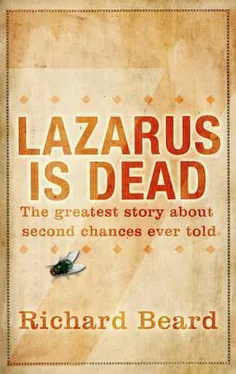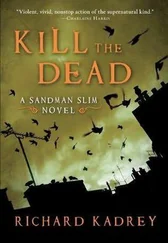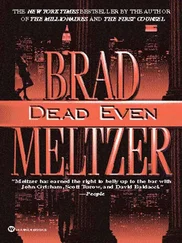At some point, probably on the Monday, Jesus ‘entered the temple area and began driving out those who were buying and selling there. He overturned the tables of the moneychangers and the benches of those selling doves’ (Mark 11: 15).
Otherwise, across the four canonical gospels, events remain vague until Thursday. Jesus spends Monday to Wednesday ‘teaching in the Temple’ (Luke 21: 37). He is sighted at Bethany (Mark 11: 11) and on the Mount of Olives (Luke 21: 37), which suggests he can move in and out of Jerusalem as he pleases. This is consistent in all four gospels, and his freedom of movement is not entirely explained by the safety-in-numbers aspect of a supportive crowd (Luke 19: 48).
Lazarus is the answer. Two thousand years of Jesus has obscured the renown of Lazarus. The Romans have one of the friends safe, so they are less concerned about the other. Jesus is at large in the city because Lazarus is imprisoned in the fortress.
‘Are you the king of the Jews?’
‘I’m an overseer of Temple livestock.’
‘Good,’ Cassius says. ‘I don’t think we have a problem with that.’
‘I cast a shadow,’ Lazarus adds. ‘When I get sick I die.’
The great fear in Jerusalem at this time is that any claimant king of the Jews will disrupt the peace between Rome and occupied Judaea. Cassius has a plan, based on the accepted principle that a messiah should aim to do some good. Instead of adding to the tension, a messiah should start by easing political relationships.
‘You’re betrothed to marry the daughter of a senior Sanhedrin priest.’
‘How would you know that?’
‘Imagine how stable this country could be if a provincial messiah married into the Sanhedrin with the blessing of the Romans. Every angle is covered — all would be sweetness and light. You and I should make a visit to Isaiah, your prospective father-in-law.’
‘I don’t think messiahs get married.’
‘Messiahs can do whatever god ordains.’
Cassius is thinking ahead, already composing his report to Rome, but Lazarus is wilfully slow. ‘You don’t have a choice,’ Cassius says. ‘Look where you are now. This is your destiny.’
‘Because you say so?’
‘Or god does. One or the other. Whichever you prefer — both at the same time.’
‘That doesn’t sound right.’
The consuls in Rome are waiting for positive news, and for Cassius to explain his mistakes. ‘No? Then perhaps you should experience the alternative.’
The next confirmed sighting of Lazarus is at the crucifixion of Jesus.
Karel Čapek, who earlier enjoyed his joke about Lazarus dying from a chill, is equally flippant about the crucifixion. Lazarus is resting in Bethany (after the stress of recent events) when he and his sisters hear news of the imprisonment of Jesus. Martha and Mary are confident that Jesus in his turn will be saved by a miracle.
The intervention, they imagine, will come in human form. Jesus will be rescued by those who owe him a debt — the nobleman from Capernaum, the man who picked up his mat and walked, the blind man who now can see. An army of five thousand fed when hungry will descend on Jerusalem to deliver Jesus from harm. Lazarus will be their leader.
Yes, he’d like that very much, only he hasn’t been well: ‘I don’t feel up to all this — the journey, the excitement … I should so much have liked to go.’
Čapek’s story is funny because absurd. Lazarus has to be present at the crucifixion. Where else would he be? The idea of his absence is laughable.
There are thousands of figurative representations of the passion and death of Jesus, and in most of the classic images a clean-shaven witness can be found in the keening crowd. From Fra Angelico in 1420 to Max Ernst in 1913, Lazarus is there. Look at a Tintoretto or a Rubens, or any of the masters of the Dutch school. Lazarus attends the crucifixion of Jesus, often in a favoured position at the front left portion of the canvas.
On Friday at midday, Lazarus will be with Jesus on the hill at Golgotha. By that time Lazarus, too, like his sisters in the story by Karel Capek, will believe he can save his friend.
Between the Sunday and Thursday of Holy Week, like the bible itself, Lazarus loses track of time.
His cell in the Antonia Fortress is a narrow room three floors above the level of the street. Lazarus stands on the end of his bed to look through the window high in the wall. A half-starved man might squirm his way through, but the outside walls offer no obvious handholds.
In the street below a cart rolls by. It is filled with straw, heading for the Temple stockyards. The street is very far down. Lazarus would have to be incredibly lucky not to kill himself. Another hay cart passes, and stops directly beneath the window. Lazarus looks down on the driver’s head, and the driver has no idea he’s there.
Lazarus sits on the bed, which is as long as the cell and half as wide. At regular intervals faces peer through the barred opening in the door. He sits on his hands. At least he has his health.
He sleeps.
Cassius bangs on the door. Lazarus wakes up.
‘I thought you were dead.’
‘I was sleeping.’
It is dark. Cassius goes away. Lazarus sits and watches a shiny black cockroach take its chances across the floor. It wants to eat and reproduce and be king of all the cockroaches. Lazarus steps on it.
He lifts his foot, and waits for the cockroach to come back to life. It does so. Several times. As long as he doesn’t step on it too hard.
He flops back on the bed, one arm trailing off the side. He counts the times Jesus has ruined his life.
5
Depression is one way in which death shows its strength. Some of the blackness of the tomb remains, and it is the darkness Lazarus can’t endure. The darkness and enclosed spaces and time going by.
Does Jesus know where he is? And had he always known it would come to this, even as a child, when they ran free in the hills above Nazareth?
Lazarus is increasingly sure he’s alive, truly alive, and with every hour that passes it is harder to believe he died. If he’d died, genuinely, then he’d still be dead. He wouldn’t be sighing at the sorrow of life in a cramped Roman cell.
He bites his lip until it bleeds. Later, he plucks out a clutch of eyelashes. He doesn’t believe in resurrection. It wasn’t death that he’d experienced, but some unnatural state of suspension, which Jesus has inflicted upon him.
If he knows. If Jesus has always known.
When Amos drowned he knew, and when Lazarus left Nazareth for Bethany. He knew that selling sheep to the Temple was an ill-omened business, and that Lazarus would never marry or return to the Galilee, would fall sick and die and come back to life and be imprisoned in the Antonia Fortress. This was always the shape his life was going to take.
The white days of their Nazareth childhood tilt and catch a different light. They have a dark underside and make unwelcome shadows: there is no coincidence and there is no luck. The story of Lazarus is a device in the life of Jesus.
Lazarus is overcome with self-pity. That’s right, Lazarus, it isn’t fair. Fall on your knees and blub. Whine and cry. Wish that you were dead.
He crawls across the cell and plants his forehead flush against the rough plastered wall. It is a long time since he prayed, and in the past he was always relieved when no one answered. It was a solace to know that he was on his own, and that whatever happened was up to him.
Now he genuinely hopes to be heard, but has forgotten how to do it. Lazarus has mislaid his certainty about what he wants, or what is worth having.
He curls up on the floor and puts his hands flat between his thighs. The mosquito bite on his knee is healing, life’s miracle at work. His body is renewing itself for no obvious reason, and he grieves for his overlaid childhood. He grieves for his vanished future and his poor, deserted sisters. He grieves his own ugly death, and his plans that have come to nothing.
Читать дальше












